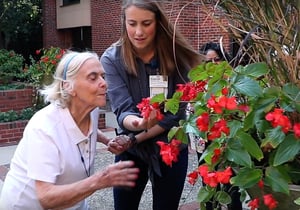
Could your aging loved one benefit from quality, person-centered care in a household setting? If so, you likely have plenty of questions. We sat down with Marjorie P. Lee’s Memory Support Household Coordinator, Susannah Jonas, to address some of these concerns.
Q: Can you describe your role at MPL?
SUSANNAH: This is always a challenge, as I dabble in all things Memory Support here at Marjorie P. Lee. In a nutshell, I serve as a point of contact for family members, residents, staff, activities, etc. to make sure things are running smoothly, and any requests, needs and/or concerns are taken care of.
Q: What are the most common signs that it’s time for a family to consider senior care for an aging loved one?
SUSANNAH: Every individual is so unique, and because of that, the aging process is complicated. I personally believe it has a lot to do with families and their individual dynamics. I’m not sure that there is any situation that is the same. Because of that, I think it’s extremely important that your family and loved ones have ongoing conversations about this topic.
Q: What are the benefits of seeking placement sooner rather than later?
SUSANNAH: Marjorie P. Lee uses a waitlist for the move-in process. A lot of folks request to be added to the waitlist early, so they have the option to say yes or no when an apartment becomes available. They do not lose their place in line—it’s simply so that when that day comes and they do feel ready to make the move, they can agree and accept!
Q: What do you think is the biggest barrier that keeps families from seeking placement or joining a waitlist?
SUSANNAH: I think there are a couple of things that play into a family’s decision-making process when starting this type of transition. Society, unfortunately, has done a great job of painting a horrific picture of what retirement communities look and feel like in general. What families don’t realize is they aren’t all that way, and it doesn’t have to be scary.
Marjorie P. Lee has taken a lot of initiative in the past couple of years to combat this, via the Master Plan! We also recognize that the aging process is challenging in many facets, not only for the elder, but the family members as well, and we do our best to support everyone involved when they are ready to take that step.
Q: How does Marjorie P. Lee determine which household is the right fit for new residents?
SUSANNAH: Each resident goes through an initial assessment process. We assess cognitive function, physical ability, and independence. This process then gives our staff some context for discussions with the resident and their families. Based on the results [of the assessment], we decide what we think will universally be best for the resident. We also continually monitor and assess the wellbeing of each resident, so it is an ongoing conversation even after they move in!
Q: How can family members protect their loved one’s independence while they transition into senior care?

SUSANNAH: I think there is such a stigma associated with retirement communities and “nursing homes.” Sometimes folks assume that people who move to a community, they lose all of their independence and ability they have to make decisions for themselves. ERS is a “person-centered” organization, which I believe is what truly sets them apart.
Staff is trained to meet each person where they are in their aging process, and encourage them to retain as much of their independence as possible, for as long as they are able! If it means that Mr. Smith takes 25 minutes to put on his socks every day, we will make sure we budget that time for him in the mornings.
Q: What are the benefits of living in a household setting?
SUSANNAH: The households here at Marjorie P. Lee are very unique, and were designed so that the residents can walk out their door, and utilize their 5 senses to guide them throughout their day; they can walk out the door and smell when it’s mealtime, hear music playing, see people gathered in the living space, etc.
Not only that, but the residents and staff on each household truly become each other’s extended family. They go to meals together, partake in activities together, and engage in conversation. When loved ones and families come to visit, their comments often reflect that too. It makes it a really special and comfortable environment for our elders to live.
Q: How does Marjorie P. Lee create a home-like atmosphere for its residents?
SUSANNAH: Marjorie P. Lee does a great job of making the physical surroundings feel home-like. When you walk into our lobbies and community spaces, there are couches and comfortable chairs and newspapers on the tables to encourage residents to sit. The spaces are very inviting.
I think what makes Marjorie P. Lee most comfortable, however, is the staff. The staff becomes part of the residents’ family and really goes above and beyond to build unique and individual relationships with each of our residents. When the residents walk through the building, they are constantly being greeted by name, and it makes them feel special!
Q: What do you like most about working as the Household Coordinator at Marjorie P. Lee?
SUSANNAH: I love that the culture here not only allows but also encourages me to take the extra time to go above and beyond to make connections and build relationships with the residents. I have loved having the opportunity to get to know each resident, and have grown to love them as if they’re my own family! Being able to serve them is truly a privilege.
Do you have additional questions about Marjorie P. Lee’s household setting? You can fill out an information request form here to learn more. We’d also love to have you visit for a tour!












